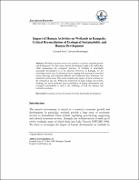| dc.contributor.author | Byaruhanga, Aloysius | |
| dc.contributor.author | Ssozi, Leonard | |
| dc.date.accessioned | 2018-12-17T13:41:50Z | |
| dc.date.available | 2018-12-17T13:41:50Z | |
| dc.date.issued | 2012 | |
| dc.identifier.issn | 2225-5656 | |
| dc.identifier.uri | http://hdl.handle.net/20.500.12280/1246 | |
| dc.description.abstract | Wetland ecosystem services are central to a nation’s sustained growth
and development. For this reason, human development ought to be undertaken
while maintaining the ecological character of wetlands if meaningful
sustainable development is to be achieved. However, in Kampala, we are
witnessing unwise use of wetland resources, ranging from pouring of untreated
wastes (sewerage and industrial effluent) and reclamation (for settlement and
industrial construction). This article examines the impact of these activities on
the wetlands in the city. Within the framework of deep ecology and systems
thinking, the article maintains that reconciliation of human development and
ecological sustainability is vital to the wellbeing of both the humans and
wetland ecosystems. | en_US |
| dc.language.iso | en | en_US |
| dc.publisher | Kisubi Brothers University College | en_US |
| dc.rights | Attribution-NonCommercial-NoDerivs 3.0 United States | * |
| dc.rights.uri | http://creativecommons.org/licenses/by-nc-nd/3.0/us/ | * |
| dc.subject | Ecosystem services | en_US |
| dc.subject | Economic Growth | en_US |
| dc.subject | Sustainable development | en_US |
| dc.title | Impact of Human Activities on Wetlands in Kampala: Critical Reconciliation of Ecological Sustainability and Human Development | en_US |
| dc.type | Article | en_US |



